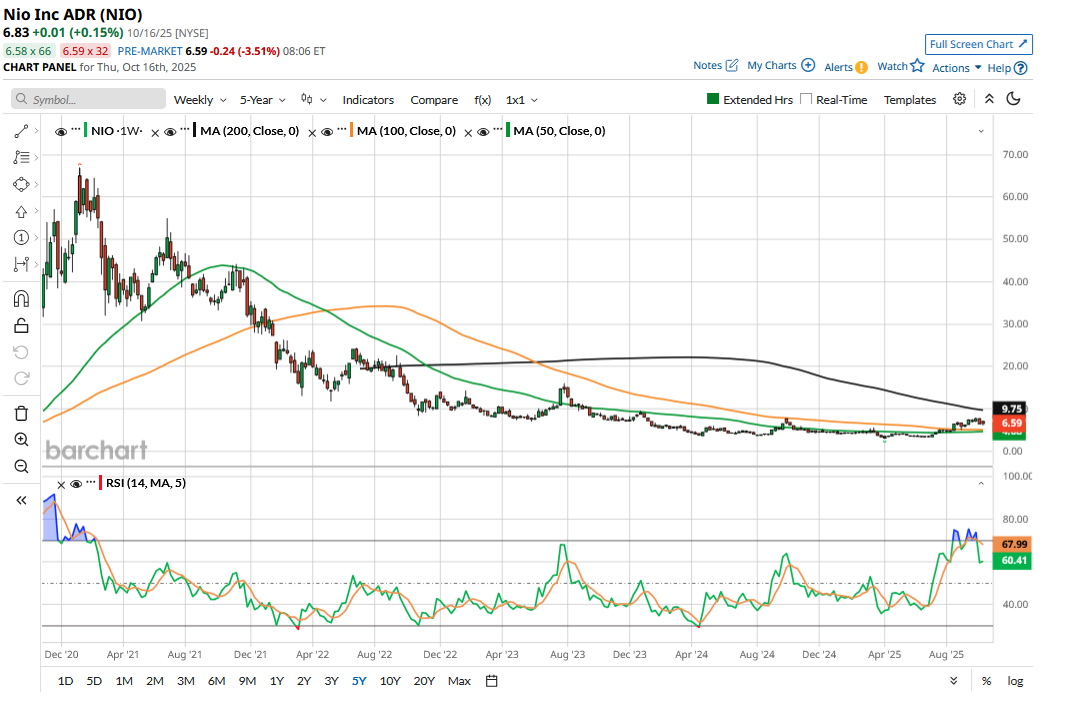/EV%20in%20showroom%20by%20Robert%20Way%20via%20Shutterstock.jpg)
Nio (NIO) shares whipsawed Thursday, Oct. 16 on reports that Singapore’s sovereign wealth fund GIC filed a U.S. securities lawsuit against the Chinese electric vehicle (EV) company, accusing it of inflating revenues to the tune of $600 million by pulling forward sales through related party transactions with Wuhan Weineng.
Nio stock was trading sharply lower in intraday trading yesterday, but it managed to shrug off the pessimism and closed in the green. While Nio is in the red today, it is in reaction to the selloff in Chinese markets today amid trade war fears, rather than concerns over the GIC lawsuit. In this article, we’ll look at GIC’s allegations against NIO and analyze how to play the stock now.

What Is GIC Alleging?
GIC alleges that NIO inflated its revenues and profits by recognizing the battery sales revenues to Weineng, which manages its battery as a service (BaaS) business, upfront. It contends that these sales should have instead been recognized gradually under GAAP accounting standards. Notably, Nio lets car buyers purchase a car without the battery, which lowers the initial price. These customers can then buy the battery on subscription.
Moreover, GIC argues that since NIO effectively had a controlling financial interest in Weineng, it should have disclosed it as a “variable interest entity” (VIE) and consolidated its financial results with its earnings.
Notably, similar accusations were made by short seller Grizzly Research in 2022. Back then, Nio dismissed Grizzly’s report as “without merit” while adding that it “contains numerous errors, unsupported speculations and misleading conclusions and interpretations regarding information relating to the Company.” In its response to GIC’s allegations, Nio said, "It stems from false allegations made by short-selling firm Grizzly Research LLC against NIO in a short-selling report released in June 2022.”
Meanwhile, GIC is already automatically covered under a class-action lawsuit against Nio, and the company reportedly went ahead with the lawsuit for greater protection and to keep its options open.
EV Companies Have Faced Fraud Allegations in the Past
To be sure, this is not the first fraud allegation against a company in the startup EV ecosystem. Nikola was accused of misleading investors by showing a prototype truck driving on a highway when it was actually rolling down a hill. Lordstown Motors also allegedly inflated its preorders and hyped its capabilities. The allegations were made by short-seller Hindenburg Research, and in both cases, their CEOs had to resign shortly after the accusations and the companies eventually went bankrupt.
The Chinese EV ecosystem has also faced recurring fraud allegations, and while a previous audit showed that some companies claimed subsidies on non-qualifying vehicles between 2016 and 2020, of late, there have been allegations of companies offloading cars to dealers, which were then sold as “used” cars.
At the heart of such behavior is the massive overcapacity situation in the EV industry. Also, EV companies are under a lot of pressure from investors to grow their sales and turn sustainably profitable.
As for Nio, it is too early to say whether the company deliberately committed accounting fraud. However, the allegations regarding Nio’s dealings with Weineng have been in the public domain for quite some time now, and there is nothing really novel in GIC’s lawsuit.
Should You Buy Nio Stock Despite GIC’s Allegations?
It is tough to price the outcome of GIC’s lawsuit against NIO, as first, we don’t know whether the company really violated any laws, and secondly, the financial repercussions are still not clear. As for Nio’s fundamentals, they have looked quite strong this year, and it delivered over 30,000 vehicles each in August and September, with shipments rising to new record highs in both these months, led by the strong sales of its L90 SUV that it markets under the Onvo brand.
The company is upbeat on its Q4 outlook and sees deliveries rising to 150,000, which is significantly higher than the 87,071 vehicles that it delivered in Q3. Management expects vehicle gross margins to rise to between 16% and 17% in the final quarter of the year, compared to 10.3% in Q2. Moreover, it reiterated its previous guidance of achieving breakeven on adjusted profits in Q4.
All said, I continue to stay invested in NIO for now, given the strong growth outlook and reasonable valuations. While the allegations, if true, would have a huge reputational impact on the company, it’s a risk that investors have been living with for the last couple of years.







